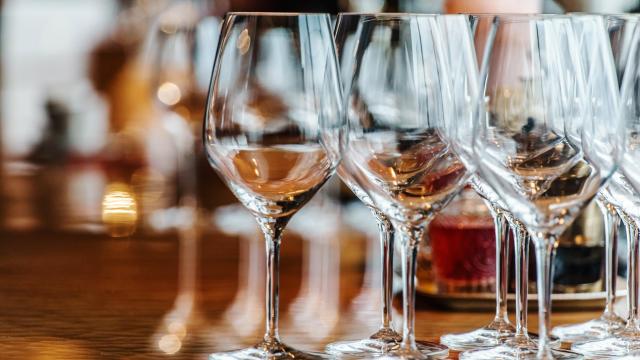The wine world is famously mystifying. Legs? Tannins? Why is everyone slurping? So it makes sense that when it comes to caring for your wine glasses, a lot of people have a lot of different opinions. In fact, when you look up the best methods to clean wine glasses, you might find more questions than answers. Different sources say different things about hand-washing, air-drying, and whether or not wine glasses are safe to go in the dishwasher. One common theme that pops up over and over, though: Using soap to clean your wine glasses may do more harm than good.
Here’s the case against soap and how you should go about cleaning your wine glasses instead.
Do I detect a hint of…detergent?
If you take a sip and notice your wine tastes “off,” don’t immediately blame the bottle as a bad batch. The real culprit may be your glass, and the soapy residue that was left behind. That soapy residue comes with a scent, and any competing scents have a huge impact on your experience of a wine.
Plus, as Wirecutter points out, repeatedly using detergent can etch your glassware and make it cloudier and cloudier. Over time, this could alter the taste of whatever wine you drink out of those cloudy glasses.
More methods to clean your wine glasses
So what should you use instead of soap? Here are some of the top detergent-free techniques to get your wine glasses sparkly clean.
The steam method
We’ve previously gone over this steam method to get rid of smudges on your wine glasses. The technique is simple: Bring some water to a boil, catch the steam in the glass, and polish the glass with a microfiber cloth.
The rinsing method
Some sources claim that all it takes to get a clean wine glass is enough hot water. Rinse the glass multiple times with hot water, making sure you can’t see any residual wine on the glass. This method is perfect for when you just had a quick glass of wine and are washing them right away, so that no lipstick stains or food sits on the glasses overnight.
Opt for vinegar
Maybe you’re sceptical that hot water will get the job done. If you must use something in addition to hot water, opt for vinegar.
Add a splash of vinegar and water to your glass, and then wipe clean using a non-abrasive sponge. Rinse well and dry the glass using a microfiber towel, so you don’t leave behind streaks or scratches.
To get a perfect polish, check out The Takeout’s restaurant-approved method for spot-free glassware:
1. Fill a 950 ml-sized plastic container or a dishwashing tub with hot water. The hotter the better, but obviously don’t burn yourself.
2. Pour in a generous splash of white vinegar. In a 950 ml-sized container, I usually added a tablespoon or two.
3. Dunk the top of the wine glass gently into the water, swishing it over all surfaces
4. Using the edge of a non-pilling kitchen towel, hold the glass by its base so your fingerprints don’t get on the stem. Use the free portion of the towel to gently but thoroughly dry the bulb of the glass. The fewer swipes, the better
5. Now flip the glass over and dunk its bottom foot into the water, still holding the glass by its stem with the towel
6. Dry the bottom foot with the towel.
Et voilà. Clean wine glasses; no soap needed.

Leave a Reply
You must be logged in to post a comment.